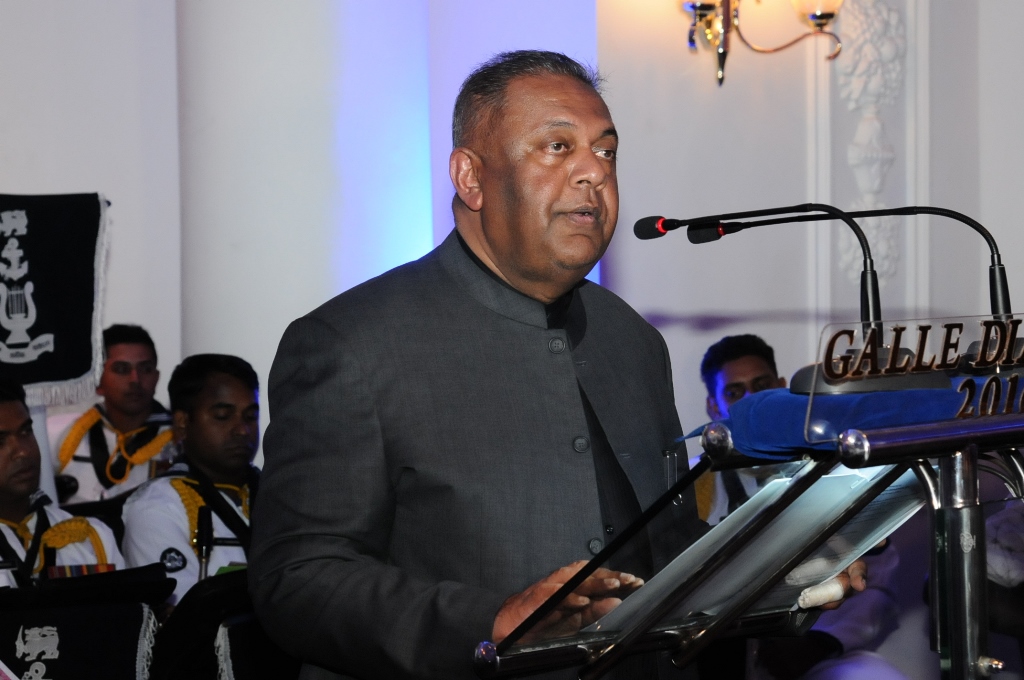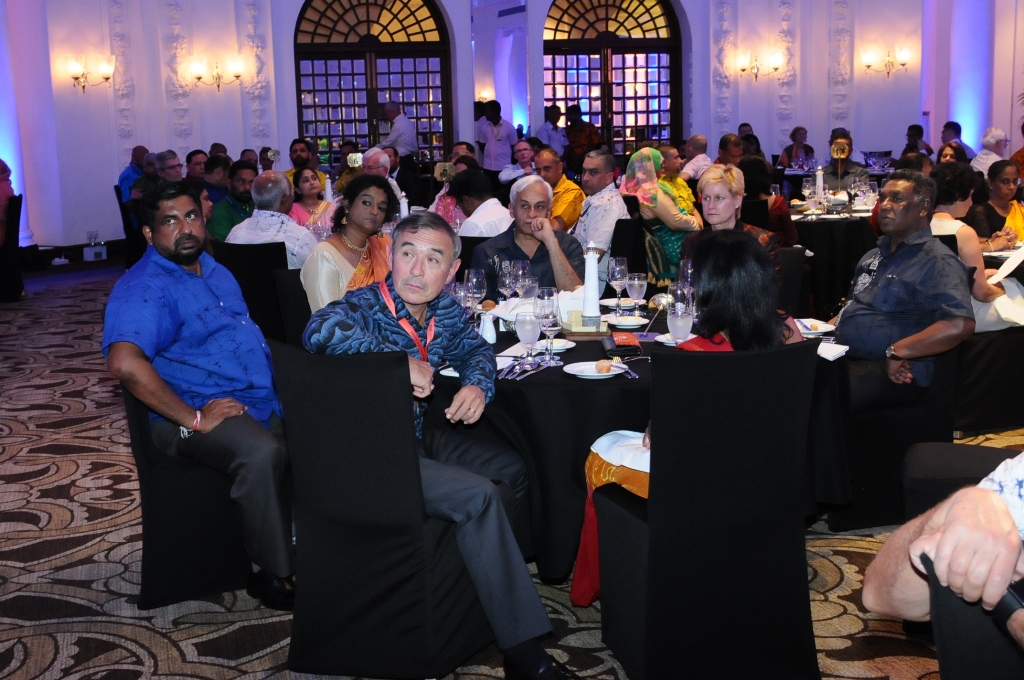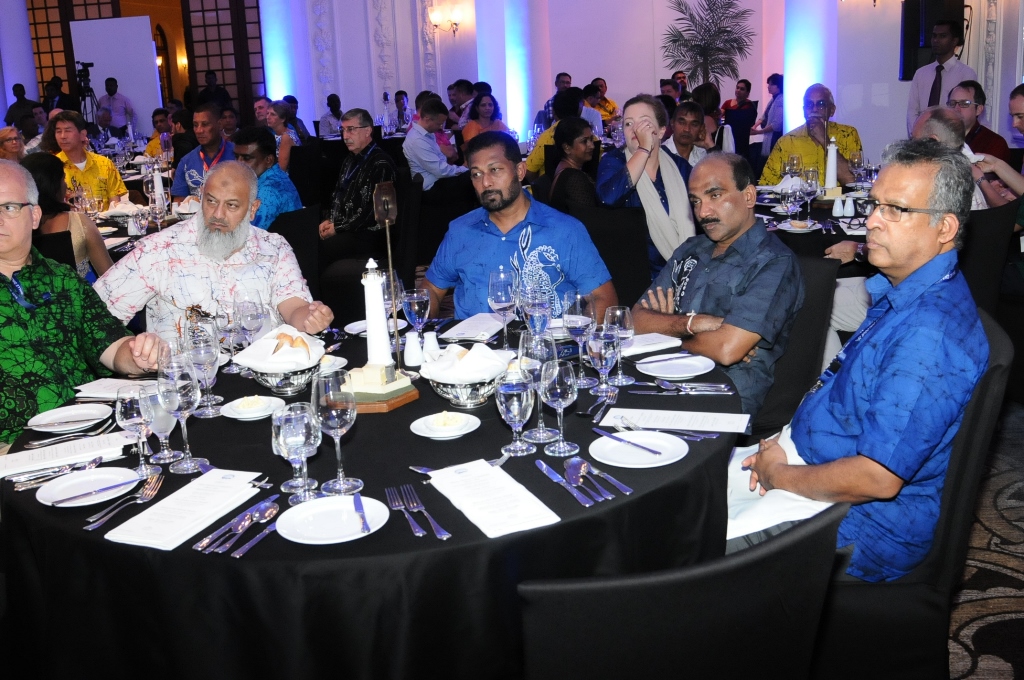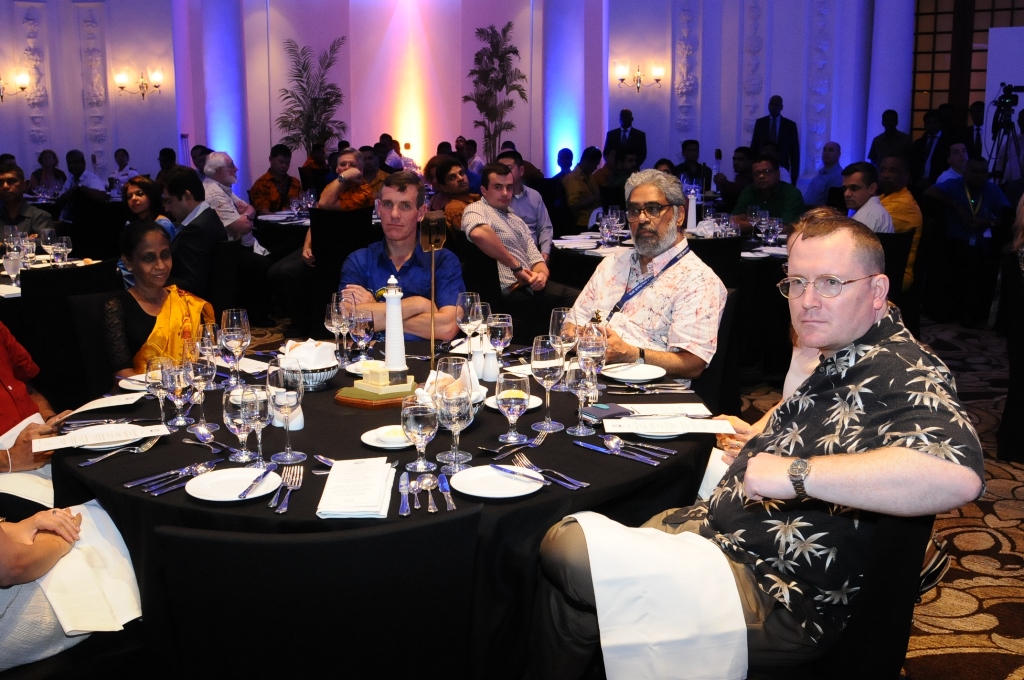

Remarks by
Hon. Mangala Samaraweera, MP
Minister of Foreign Affairs
Banquet hosted by the Commander of the Navy on the occasion of the Galle Dialogue 2016
28 November 2016
Commander of the Navy, Vice Admiral Ravindra Wijegunaratne,
Secretary of Defence, Mr. Karunasena Hettiarachchi,
Commanders of the Army, Air Force and the Chief of Defence Staff,
Distinguished delegates from abroad and Sri Lanka,
Your Excellencies,
Ladies and Gentlemen,
First of all, let me thank and congratulate Vice Admiral Wijegunaratne and his extraordinary team in the Sri Lanka Navy for organizing the International Maritime Conference: 'Galle Dialogue’, for the 7th successive year.
What started in 2010 in the historic port city of Galle which I believe many of you visited yesterday, lent its name to this Dialogue, has since expanded over the years, and has today managed to gain the attention and recognition of all the key maritime players in the Asia-Pacific region and beyond[1].
I understand that some of you visited Galle yesterday and as you know Galle is a special city in our nation’s maritime history. Our first contact with the United States probably took place when an American Merchant Ship called at the Galle Harbour somewhere around the same time that the newly formed American Republic adopted its Constitution. Recorded history tells us that this was a prominent sea port through which early seafaring nations were all conducting business.
The modern history of Galle is said to have begun with a small fleet of Portuguese ships that arrived in the 16th Century. Originally established by the Portuguese, Galle Fort was later developed by the Dutch as a major trading hub and today it is a UNESCO World Heritage Site.
So, it is but natural that this dialogue that now takes place in the modern era on matters that relate to the realm of our oceans, and impact countries and regions even beyond the Indo-Asia-Pacific, should be named the ‘Galle Dialogue’.
Ladies and Gentlemen,
Since the end of the Cold War, Indian Ocean security has entered a new phase. New relationships are in the making. Moreover, the rapid economic growth witnessed by key Asian States and their blue-water naval capabilities have ushered a new strategic environment, and the Indian Ocean has become an extremely important geo-strategic space.
A fresh perspective is required to ensure maritime security and strategic stability in the Indian Ocean region by fostering strategic maritime partnerships. In this context, the theme of this year’s ‘Galle Dialogue’ – ‘Towards Fostering Strategic Maritime Partnerships in the Indian Ocean’ is especially significant.
Ladies and Gentlemen,
The Indian Ocean is the third largest body of waters in the world. Nearly 40 percent of the world’s offshore petroleum is produced in the Indian Ocean, through which two-thirds of global sea-borne oil trade transits. We all are aware that the uninterrupted flow of hydro-carbon energy is vital for the Asian economies and beyond.
The prosperous and emerging growth centres in Asia count on globalized supply chains and distribution networks across the ocean for their continuous prosperity.
The economic resurgence of Asia with the spectacular growth witnessed by key Asian States, and the resultant accumulation of power and wealth, have an impact on the maritime security in the Indian Ocean.
The countries in the Indian Ocean littoral and hinterland are enmeshed in a complex web of relations of amity and competition at multiple levels. Unresolved political and territorial issues inherited from the past, and contemporary regional strategic issues have implications on maritime security in the Indian Ocean.
Piracy, gun-running, human-trafficking, narco-terrorism are some of the threats that are frequently encountered. According to the International Maritime Organization (IMO), the Straits of Malacca, the South China Sea and the Indian Ocean are the areas that have been most affected by piracy.
Gun-running by sea is apparently considered the most convenient method for the mass-scale transfer of weapons from arms bazaars to destination points. There is a close nexus between gun-running, human trafficking and narco-terrorism, as terrorist groups often work hand-in-glove with drug cartels.
Mining of choke points by international terrorist groups to disrupt the economic life of identified enemies is not a remote possibility. Even a mere threat by a terrorist group,let alone execution, holds the possibility of creating chaos.
It is important to consider the nature of threats, and the agents of threats to the safety and security of sea lanes of communication, in this context.
The threats that emanate from non-state actors in the Indian Ocean compel State actors to cooperate with each other, and to view naval diplomacy as a means towards tangible objectives.
Meanwhile, non-traditional threats rooted in social, economic ecological and political choices confront the region. These include, among others, endemic poverty and hunger; climate change, environmental degradation; rise in sea-levels; floods, cyclones, and droughts; mal-governance and resultant deterioration in law and order; trafficking in persons and illegal drugs; gender discrimination; theocratization of societies and human rights violations. These hold the potential of giving rise to massive dislocation of people and strategic security complications.
Therefore, man-made and natural disasters, as well as humanitarian emergencies are important factors in the Indian Ocean and its littorals today that compel us to work together for peace and stability in the region, and the safety and security of sea lanes. It is important for all stakeholders to find ways and means to partner with a sense of compassion in times of disaster in the Asia-Pacific, upholding the highest standards of integrity and character.
To ensure maritime security and safety of sea lanes, we require attention and participation of major Naval Forces. We also need the involvement of all stakeholders in various traditional and non-traditional security aspects that can have implications on maritime security to be a part of this exercise, and to discuss issues and cooperate for the common good.
It is important to focus attention on the importance of building rules based maritime security architecture, respecting international law that can mobilize all stakeholders to create, preserve, and maintain peace and stability in the Indian Ocean.
Freedom of navigation and overflight and other lawful uses of the sea and airspace according to international law must be preserved as rights for all, if the Indian Ocean is to continue as a zone of peace.
The development of multi-level partnerships for cooperation with all stakeholders, for collective action, is important.
The focus of the Indian Ocean Rim Association (IORA) still mostly remains within the parameters of economic cooperation, but with huge potential for Maritime Safety and Security. The current agenda of the BIMSTEC does not address maritime security issues.
The ‘Galle Dialogue’ provides an excellent platform for this purpose, and the fact that Sri Lanka is located at the very centre of the Indian Ocean, makes it a logical location to conduct an extended form of Naval or Maritime diplomacy with multiple stakeholders and partnerships and sharing information on maritime awareness at a broader level, encompassing the traditional Navy-to-Navy efforts. In fact, the presence of Commander of the US Pacific Command, Admiral Harry Harris, Inspector of the German Navy, Vice Admiral Andreas Krause, the Chief of the Indian Navy, Admiral Sunil Lanba and Commander of the Royal Netherlands Navy, Lt. Gen. Rob Verkerk, as well as the presence of delegates from 42 countries and 12 organisations is an indication that the Galle Dialogue has become an important event in the global maritime security calendar.
Ladies and Gentlemen,
With the people in our country exercising their ballot twice last year for accountable democracy, rule of law, good governance, reconciliation, a durable peace and a fresh and renewed relationship with the wider world beyond our shores, the National Unity Government under the leadership of President Maithripala Sirisena and Prime Minister Ranil Wickremesinghe, is determined to ensure that Sri Lanka becomes a pillar of stability and prosperity. In doing so, Sri Lanka must start looking beyond its traditional identity as a South Asian Nation and project itself as a vibrant and dynamic Indian Ocean island entity. The ocean around will open the gates for a bright and prosperous future, if the possibilities are harnessed effectively and intelligently.
Sitting at the crossroads of Africa, South Asia, and East Asia, we seek to develop Sri Lanka as a hub for trade and investment while working with all our partners to support maritime security and safety.
Ladies and Gentlemen,
In concluding my remarks, again I would like to take this opportunity to congratulate you, Commander Vice Admiral Wijegunaratne, for organizing this event. I hope your interactions here at Galle Dialogue will reach productive conclusions to foster closer cooperation in the maritime sector.
Thank you.
***
[1] There are 41 countries and 12 organisations represented by 132 delegates participating this year.







